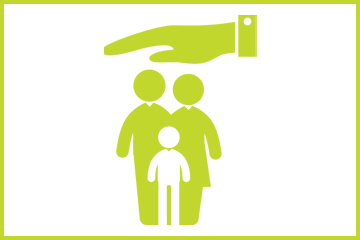
NO COVID VACCINE, NO LIFE INSURANCE
Insurers are relaxing tough pandemic rules, but you still may not get cover if you have not had both jabs
Older people and those at most risk of serious illness if they catch Covid may be denied life insurance cover if they do not get the vaccine. This could affect some 3.7 million people in England who are classed by the government as vulnerable when it comes to the coronavirus.
Since the start of the pandemic, insurers have been less willing to provide life insurance, income protection and critical illness products to anyone with health conditions that put them at higher risk.
Three insurers have said that they are now more willing to offer them cover if they are double-vaccinated.
Legal & General (L&G), Scottish Widows and Guardian 1821 say that anyone who is double-vaccinated now has the same chance of getting cover as they did before the pandemic. Those considered vulnerable to Covid, according to the NHS, are those with severe asthma, emphysema, a serious heart condition or kidney failure. Insurers are also taking into account age, with people over 70 considered more likely to suffer serious complications from Covid.
The fact that some insurers are asking about vaccinations reflects the difficulties they are having in assessing risk after a public health emergency It is likely that other caveats will be added to make it harder to get cover.
Insurers do not ask applicants about any other form of vaccine. When seeking life or income cover you will not be asked about flu shots, the MMR vaccine or the HPV vaccine, and even at-risk customers are not asked about the hepatitis B or chickenpox vaccines.
With the boom in the property market, there has been a surge in applications for life cover to protect bigger mortgages. The pandemic has also caused many people to realise how fragile their earnings are, so interest in income protection has increased.
The Association of British Insurers said: “Vaccinations should not affect existing policies, but for new applications a couple of insurers have introduced questions that would help those who might have previously struggled to get cover.”
It is likely that other insurers will follow suit, but only asking about Covid vaccines and not for ever, said Alan Knowles from the insurance adviser Cura. Brokers say that while the insurance industry is beginning to open up for those with underlying health conditions, older customers are still struggling to get cover.
Before the pandemic most 70-year-olds with diabetes would be able to get insurance, although they would pay much higher premiums than younger people with the same health conditions. During the pandemic everyone would have struggled to find cover, but older people are still unlikely to get insurance now. “Insurers are now much more nervous about older clients,” Knowles said.
Most insurers are not back to their pre-pandemic attitudes to risk, although Aviva and LV= are the most flexible. “It shows the importance of shopping around or speaking to a broker,” said Kevin Carr, a former broker who now runs his own consultancy. “Different insurers take a different view, and it is changing all the time. If you can’t get cover from one, don’t take it to mean you are uninsurable.”
When the pandemic began, all insurers added questions about coronavirus to their application forms, but they are becoming more relaxed about your answers.
If you have Covid, it is likely that the insurer will postpone an application while it considers whether there are any long-term implications for your health and seeks further information. AIG Life is to reduce the postponement from 30 days to two weeks, and to apply it only to those who are more vulnerable to coronavirus. Zurich too is cutting its postponement period.
When it comes to long Covid, insurers are focusing on the symptoms rather than a diagnosis. If you are struggling with fatigue relating to long Covid, insurers will view this in the same way as chronic fatigue syndrome — if you are covered for that, you will be covered for long Covid.
Brokers say that income protection applications are more likely to be affected if you have had coronavirus because insurers are mostly concerned about how the virus affects your ability to work, particularly with the increase in people suffering from long Covid. All insurers recognise Covid as a valid reason for a claim, and they paid a total of £6.2 billion, or £17 million a day, in claims last year.
L&G said: “The decision around what cover will be available will be based on why the individual has been classed as vulnerable, for instance the underlying health conditions. Not having had the vaccine does not in itself rule someone out of cover and will only affect 1 per cent of customers.”
Scottish Widows, part of Lloyds Banking Group, has a “higher risk appetite” for those who are fully vaccinated.
Caroline Froude from Guardian 1821 said: “We always look to provide cover where it’s possible. In light of the virus, we may ask applicants for their vaccination status. For most it has no impact on our decision to offer cover.”
The Times, Saturday October 16 2021

Write a Comment